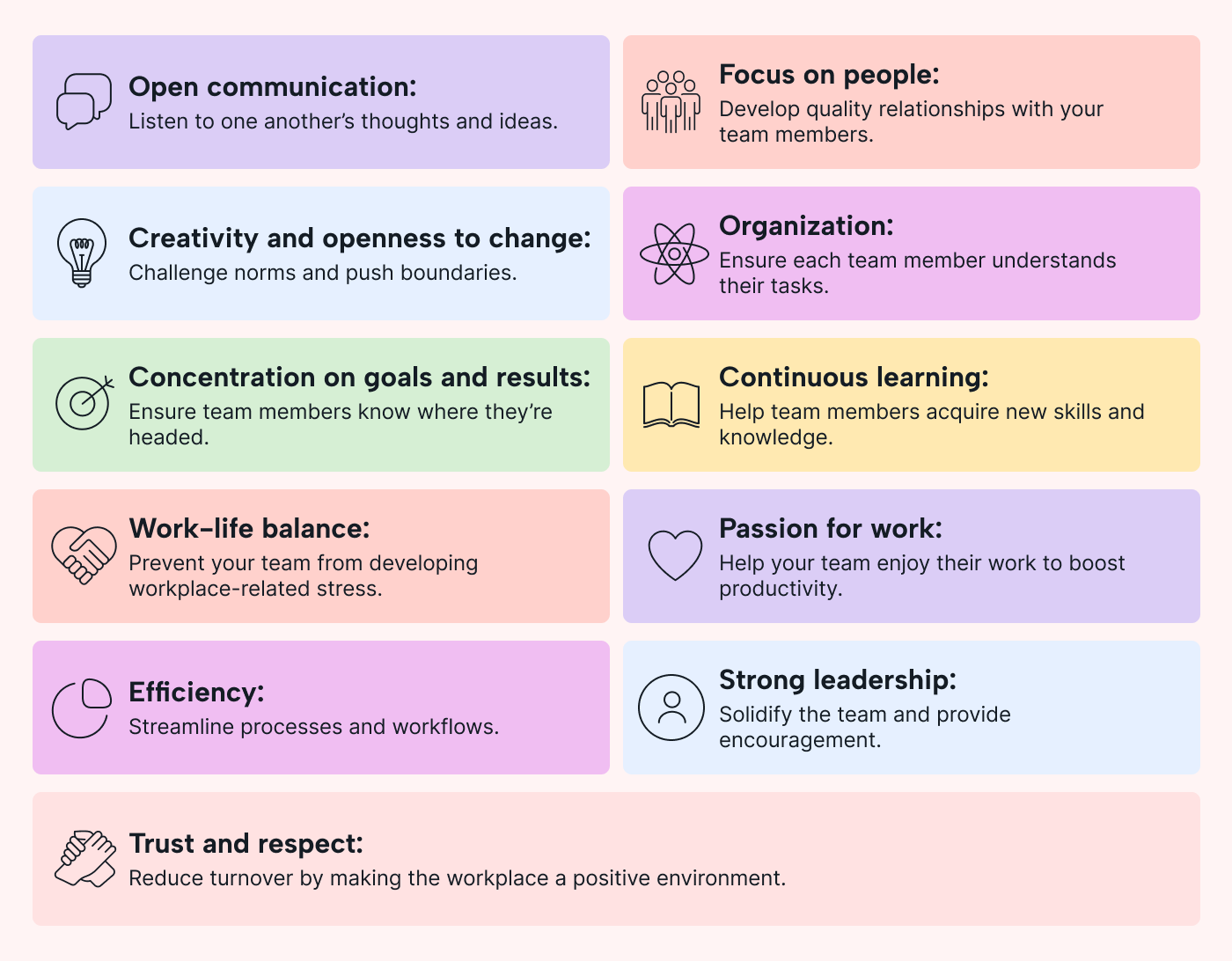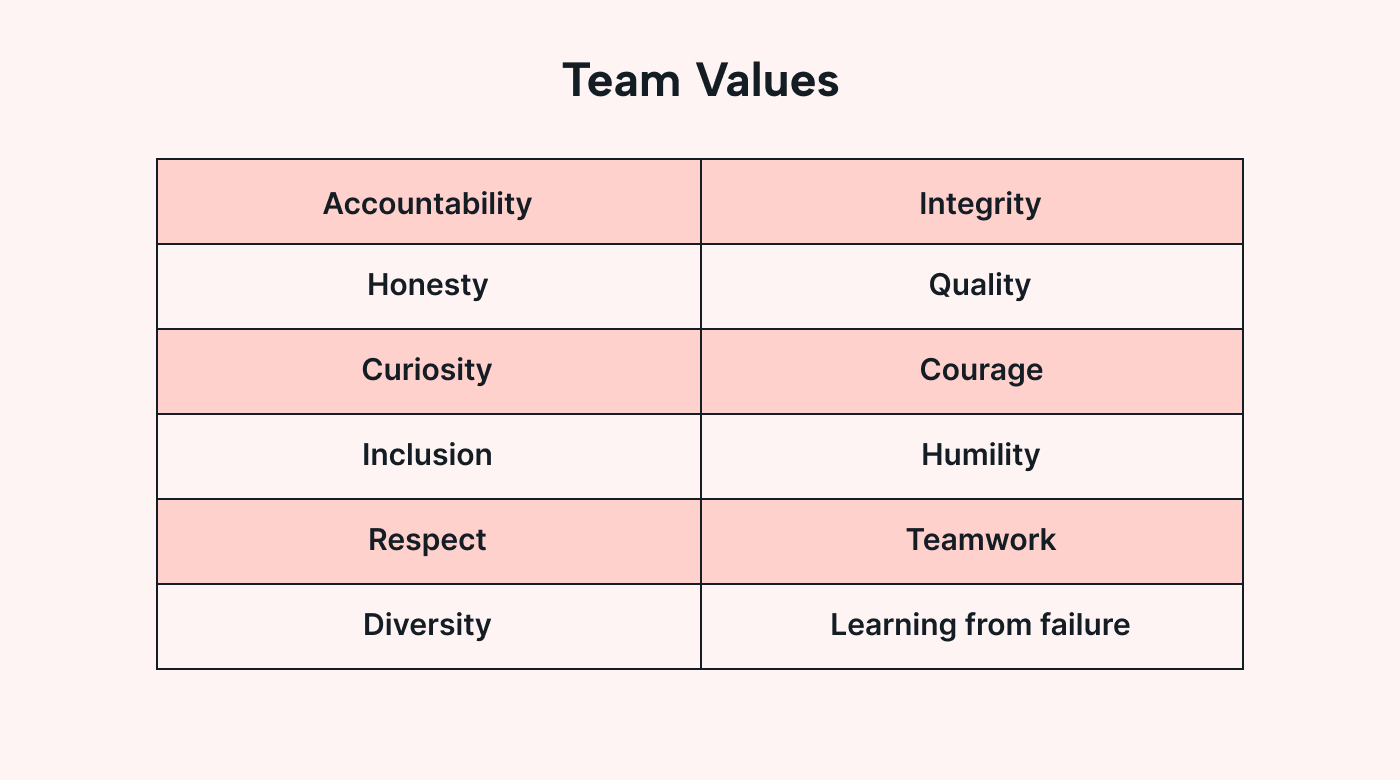Ever wondered why some teams just seem to crush it?
Their success isn’t just some magic potion — it’s all about having strong team values.
Nurturing and developing team values is worth the time and effort, as it helps improve communication and reduce conflicts.
In this article, we’ll dig into the topic of team values and their importance. We’ll also cover examples of team values for inspiration and discuss best practices for developing them.
What are team values?
Team values are shared rules (typically in alignment with the organization’s core values) that direct a team to work together. Teams use them to define a basic standard of acceptable behavior and performance in the workplace — making it easy for team leaders to recognize talent and success.
11 common team values for inspiration
Here’s a list of team values we recommend incorporating into your company:
 |
1. Open communication
Everyone knows communication is important — but it’s not always easy to follow through with it. That’s why it’s important to make open communication a prominent team value.
Open communication allows team members to:
- Share their thoughts and ideas: You never know who will bring in a revolutionary idea to propel the team’s success.
- Listen to each other: Listening to others lets team members build on the ideas they hear.
Effective communication is essential for equally effective teamwork. It helps ensure the team avoids misunderstandings, completes their tasks promptly, and takes advantage of all opportunities. All of these things lead to improved team performance.
2. Focus on people
People make your team. People make your business. People make customers.
Clearly, people make the world go ‘round — so it’s important to focus on them. The result of this focus? You build strong partnerships with your customers.
A quality relationship between your employees and your clients will make the former more productive, resulting in top-notch customer service. Then, suddenly, hitting those company goals will feel like a walk in the park!
3. Creativity and openness to change
Successful people aren’t afraid to color outside the lines — they’re the rebels of innovation.
Establishing creativity and openness to change as a team value will help create not only successful employees but also a team that dares to challenge norms and push boundaries.
What’s more, your fearless team may achieve more than you’d initially expected.
4. Organization
Organization is how you turbocharge efficiency.
When a team is well-organized, each member understands their tasks and nails them perfectly — while also meeting their deadlines.
You can also have guidelines empowering team leaders to delegate tasks according to the skills, strengths, and expertise of each member. This way, everyone brings their A-game and can conquer their collective goals together.
5. Concentration on goals and results
This team value is about making your team a powerhouse!
Shift your focus from just your tasks to setting business goals that spell out success and results. That way, each team member becomes fully aware of where the team is headed, what their individual role is, and the game plan to achieve the team’s goals.
6. Continuous learning
Success and growth can only happen when there’s a willingness to continue learning and keep up with the times.
 |
Promote continuous learning so that your employees can acquire new knowledge and skills. This is necessary to improve individual and team performance; it also gives you an edge over your competitors.
7. Work-life balance
Work-life balance is a team value you don’t want to ignore, as it helps protect your team from workplace stress.
When you and your team are hustling every day, it’s very easy to make work your entire life. The result? Reduced productivity, burnout, and higher employee turnover.
Fortunately, there are simple ways to promote work-life balance. Ensure your employees have enough free time for friends, family and hobbies. You can also encourage them to get together outside of work — whether that’s virtually or in person — to help them build deeper relationships.
8. Passion for work
Passion for work is the rocket fuel that keeps things exciting and productive. It motivates people to do their best possible work. This, in turn, results in successful projects.
One employee’s passion can ignite the same fire in another employee, creating a chain reaction that ultimately enhances the team’s satisfaction and productivity.
9. Efficiency
Efficiency is all about doing more with less. When a team values efficiency, streamlined processes and workflows result. This leads to increased productivity and better time management.
10. Strong leadership
Team values aren’t always generalized. You should also have specific team values for leadership roles and higher-ups. For example:
- Team leaders should ensure each member works to achieve the team’s goals.
- Team leaders should be experts at task delegation based on their team members’ skills and abilities.
- Team leaders should provide encouragement and motivation and ensure that all members are aware of the team’s progress.
11. Trust and respect
According to a Deloitte survey, 79% of employees who trust their employer are less likely to leave and are more motivated.
Want that for your team as well? Just incorporate trust and respect into your list of company values.
Building trust-based relationships and mutually beneficial partnerships among your teams can improve your collaboration and teamwork like never before.
We’ve covered 11 specific team values worth incorporating into your team. As a bonus, here’s a table with even more:
 |
Why are team values important?
Team values have a number of benefits. Here are just a few:
1. Prevent conflicts
No team is immune to conflict. However, team values like open communication and organization help prevent misunderstandings among members and create a foundation for resolving disagreements.
2. Cultivate a collaborative and positive team environment
Team values make collaborative work more efficient, helping teams perform better and achieve their goals.
But wait — there’s more! Collaboration brings about work harmony, which ultimately helps team members improve their performance.
The result is positivity among team members, even when faced with challenges.
3. Boost team members’ performance and organizational growth
Team values can improve teams’ productivity, enhancing their performance.
And this has a ripple effect. Watching others kill it at work will inspire individual team members to up their game. Add to that a lower employee attrition rate. Employees with a strong sense of connection with their team are 19% less likely to job hunt and more than twice as likely to feel a strong sense of belonging. Team values make this magic happen by improving employee satisfaction.
4. Make team goals known
Team values promote goal awareness and serve as the North Star for a team’s performance and actions. Everyone on the team will know the common goals and how to go about meeting them. This clarity will allow the entire team to bring their A-game.
5. Improve the organization’s reputation
Your team represents your company. The values they learn stay with them forever, which remains evident even if they pursue a new career.
Imagine one of your employees goes off to another organization, and their new employer sees strong team values in them. The employer will likely assume that the employee acquired these values at your organization, leading to instant good vibes for your company.
6. Attract new talent
When a team follows established values, it becomes a magnet for new talent.
Why?
Because team values are an indication of an inclusive work culture, which is something employees need to feel safe and welcomed.
 |
In other words, it’s not just about the paycheck. Employees care about joining a crew that feels like home.
7. Ensure discipline
Team values instill discipline, meaning each member is laser-focused on their work quality and performance while also respecting their other commitments.
8. Shape the organization’s work culture
Company culture influences a team’s attitudes, behaviors, and interactions.
For example, if your organization celebrates the achievement of group goals, then you clearly embrace an organizational culture of collectivism and praise.
How to create team values
Here are some steps you can take to create team values:
1. Decide on your team
Who should be involved in coming up with your team values? Decide on that first. Don’t skip this step, especially if you have a large team.
2. Brainstorm a list of values
Brainstorm what’s most important to your company with the team you chose in the previous step. You can do this by setting up a meeting or allowing everyone to submit their ideas anonymously.
To initiate the brainstorming process, kick things off with questions that’ll set the wheels of creativity in motion. For example:
- What leadership behaviors inspire and motivate you?
- What drives the team when working together?
- What has been the most meaningful moment you’ve experienced on the team so far?
- How is your current team different from the teams you’ve had in the past?
3. Narrow down the list of values
Once you have a list of potential team values, it’s time to reduce it to a few core ones that best represent your team.
4. Allow team members to reflect and contribute
Ask your team members for their opinions on the narrowed-down list. Have each of them rank the values in order of importance to them.
You can do this one of two ways:
- Allow them to reflect independently on their existing core values.
- Let them reflect on their answers openly in a group meeting.
Once this is done, discuss each member’s answer and ensure everyone feels comfortable sharing their opinions. By the end, you’ll have a crystal-clear list that captures the heart and soul of what the team collectively values.
5. Come to a consensus
Come to a consensus as a team. Determine which core values should be set in stone for your company.
 |
6. Create a statement or phrase
Convert your agreed-upon team values into simple statements or phrases. Why? To make them easier to remember and more likely for your team to follow.
An example would be, “We always put our customers first.”
7. Display your team values prominently
Lastly, you want to ensure your team respects the team values at all times. The easiest way to do this is to display the values in your workspace. For example, you can print them on posters or office swag. This will help them stay in your team members’ minds.
Try Motion and watch team values in action
Strong teams have a shared vision and sense of purpose. And team values help your company establish these things.
When you create and embrace team values, your team becomes a powerhouse for collaboration, with everyone knowing their part in propelling the organization. Throw in some team-building exercises, and you’ll witness your squad leveling up — with tighter bonds formed, morale boosted, and a workplace that buzzes with energy.
You can elevate your game even further with Motion, the project management maestro. Once you assign tasks, Motion optimizes your team members’ calendars day by day. The result? A bird’s-eye view of your team’s work and progress.
Ready for Motion? Sign up for the 7-day trial today.





